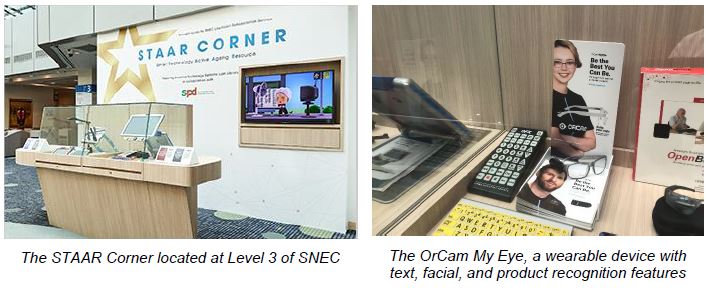Media Release For Immediate Release
New STAAR Corner at Singapore National Eye Centre offers digital devices enabling people with low vision to see better
SNEC’s Inaugural Assistive Technology Vision Week entailed forum discussing use of assistive devices and smart technology for people with low vision.
Singapore, 16 October 2021 — The Singapore National Eye Centre (SNEC) marked its inaugural Assistive Technology Vision Week today. Held via a public webinar and forum with partners of SNEC, it aims to raise awareness of how assistive technology can improve the quality of life for those with low vision. The event also saw the official launch of the Smart Technology Active Ageing Resource (STAAR) Corner at SNEC, intended to benefit people with low vision. The webinar was graced by Mrs Josephine Teo, Minister for Communications and Information, and Minister-in-charge of Smart Nation and Cybersecurity.
Low vision refers to vision impairment that cannot be improved by glasses, medication or surgery. A person with low vision can have a variable extent of vision loss ranging from reduced vision clarity, difficulty seeing in the dark and/or glare sensitivity which affect his/her functioning in daily living. It is estimated that 1.5% of Singaporeans are living with low vision. Low vision can happen at any stage in life but it is more common in the elderly due to age related eye conditions. However, people with low vision have remaining useful vision that can be rehabilitated to help them continue leading a life of independence.
Speaking at his opening address at the event, Professor Wong Tien Yin, Medical Director at SNEC, said: “Increased rates of chronic eye diseases prevalent among the elderly may result in irreversible visual impairment, leading to significant healthcare burden in Singapore in years to come. Despite the digitalisation of the healthcare landscape and advent of telemedicine which aim to improve healthcare quality, access and cost-effectiveness, a digital divide exists with the elderly and those with visual impairment.”
STAAR CORNER AT SNEC
The STAAR Corner features an Assistive Technology loan library established in collaboration with local disability-focused charity SPD to offer trial and loan of assistive technology devices to SNEC patients with visual impairment. These devices include video magnifiers, dome magnifiers, screen enhancement software, talking scientific calculators, Braille tablets, high contrast keyboard overlays, head-mounted magnifying glasses, jumbo-sized universal remote controls, and more. Also available is the OrCam My Eye, a wearable device developed in Israel that can read text, recognise face and identify products. It was sponsored by Mandarin Opto-Medic Co Pte Ltd, and presented to SNEC by the Embassy of Israel in Singapore. There are also plans in the near future to utilise artificial intelligence in the treatment and management of patients with visual impairment.

“Our STAAR Corner aims to provide an assistive device library with digital education resources and training aimed at helping the older and visually impaired patient to better use digital technology to stay independent and connected to society,” said Clinical Associate Professor Anna Tan, Senior Consultant, Medical Retina Department, and Clinical Advisor, Low Vision Service, SNEC.
Since the soft launch of the Assistive Technology loan library in end March 2021, 92 patients have explored the use of these assistive technology devices during their low vision consultation, with 16 of them loaning the devices home. Patients who wish to loan the devices will be assessed for suitability by one of SNEC’s low vision optometrists, and they will be taught how to use the devices. These loans and trials enable patients to make more informed decisions on the best type of assistive technology to adopt for their needs.
Mdm Rita Leong, who lives alone and has low vision, has adopted the use of assistive technology in her daily life. “My tablet is a great help to me. I use it to text my family who live in the US and Australia. I also use it to attend Mass first thing on Sunday mornings,” shared the nonagenarian. “I would encourage others who have low vision to use this too,” she added.
“There are many forms of assistive technology devices in the market today, but many visually impaired people and elderly are either unaware about them or unsure about how to go about incorporating them in their lives. In setting up the AT loan library together with SNEC, our aim is to reduce the barriers to adoption of these devices, and we hope more can stand to benefit from the various resources available that would help them live more independently,” said Ms Joyce Wong, Director, Centralised Services at SPD.
For more information on the STAAR Corner at SNEC, please visit
https://www.snec.com.sg/AT-loan-library.
About SNEC
Singapore National Eye Centre was incorporated in 1989 and commenced operations in 1990. It is the designated national centre within the public sector healthcare network, and spearheads and coordinates the provision of specialised ophthalmological services with emphasis on quality education and research. Since its opening in 1990, SNEC has achieved rapid growth and currently manages an annual workload of 400,000 outpatient visits and 40,000 major eye surgeries and lasers.
Ten subspecialties in Cataract and Comprehensive Ophthalmology, Corneal and External Eye Disease, Glaucoma, Neuro-Ophthalmology, Oculoplastics, Pediatric Ophthalmology and Strabismus, Refractive Surgery, Ocular Inflammation and Immunology, Medical Retina and Surgical Retina have been established to provide a full range of eye treatments from comprehensive to tertiary levels for the entire spectrum of eye conditions.
SNEC was accorded the Excellence for Singapore Award in 2003 for achieving excellence in the area of Ophthalmology, thrusting Singapore into international prominence. In 2006, SNEC received the first Minister for Health Award for public health. Clinician scientists from Singapore National Eye Centre and Singapore Eye Research Institute were awarded the prestigious President's Science and Technology Award in 2009, 2010 and 2014 for their outstanding contributions in translational, clinical and epidemiological research in cornea, retina and glaucoma. Visit us at
www.snec.com.sg.
